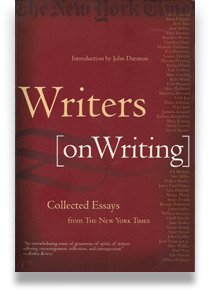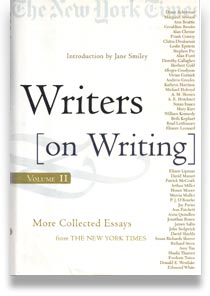Writers on Writing ~ John Darnton (intr.)

Schrijvers die het over hun vak hebben, had ik daar laatst niet al een haast onafzienbare reeks interviews over doorgenomen? Dat klopt, maar deze essays uit The New York Times waren ook heel prettig om te lezen. Zelfs al hebben ze de pretentie niet de schrijvers te portretteren, laat staan zijn of haar oeuvre te duiden. Dit zijn gewoon aangenaam korte stukken, elk van rond de 1.800 woorden, waarin ervaren auteurs het over éen of twee aspecten van hun vak hebben.
Ik bedoel, net zo makkelijk had ik een boek gelezen dat ‘Loodgieters over loodgieten’ heette, of ‘Ambulancebroeders over ongelukken’. Maar schrijvers hebben nu eenmaal het voordeel gewend te zijn voor een publiek te werken, en zullen enige moeite doen de lezer niet te vervelen.
Verder is het moeilijk iets algemeens te zeggen over de uitspraken die ze doen. Behalve dan dat het me niet verbazen zou dat dit boek, en het tweede deel, ergens als lesmateriaal zou dienen voor een cursus ‘creative writing’. Terwijl dit toch geen kookboek is, met uitgewerkte voorbeelden. De recepten waarmee enkele schrijvers ooit succes kregen, leveren niet automatisch een ander iets pruimbaars op.
Niettemin:
artists are a lot like gangsters. They both know that the official version, the one everyone else believes, is a lie.
Russell Banks

I can’t remember how many times I advised students to stop writing the sunny hours and write from where it hurts: “No one wants to read polite. It puts them to sleep.”
Anne Bernays

Some of the most thoughtful if not ingenious criticism written today is written by critics of film who, often as not, address themselves to work that is hardly worth their attention. The most meretricious or foolish movie will elicit a cogent analysis. Why? It may be a film’s auspices that obligate the critics. But it may be that, however unconsciously, they mean to reaffirm or defend print culture by subjecting the nonliterate filmgoing experience, good or bad, to the extensions of syntactical thought.
E.L. Doctorow

Most writers write too much. Some writers write way too much, gauged by the quality of their accumulated oeuvre.
Richard Ford

I keep aiming toward that novel that is just that, a true novel, but a novel for our time, dealing with an essential theme and an essential message in a subterranean, carefully hidden way, a message like a snake in the grass, as Trollope put it. There’ll be no boy meets tractor, nor even a professor meets sophomore.
Hans Koning

For the past 30 years the greatest novelists writing in English have been genre writers: John le Carré, George Higgins and Patrick O’Brian.
David Mamet

to write is to practice, with particular intensity and attentiveness, the art of reading. You write in order to read what you’ve written and see if it’s O.K. and, since of course it never is, to rewrite it ? once, twice, as many times as it takes to get it to be something you can bear to reread. You are your own first, maybe severest, reader. “To write is to sit in judgment on oneself,” Ibsen inscribed on the flyleaf of one of his books. Hard to imagine writing without rereading.
Susan Sontag
* NB: de tekst van al deze essays, en nog enkele meer, staat ook online
Writers on Writing
Collected Essays from The New York Times
Introduction by John Darnton
268 pagina’s
Henry Holt and Company, 2001
** in dit boek zijn de essays opgenomen van:
[gelinkte namen verwijzen naar auteurs die al eens geboeklogd zijn]
- André Aciman
- Russell Banks
- Rick Bass
- Saul Bellow
- Anne Bernays
- Rosellen Brown
- Carolyn Chute
- Nicholas Delbanco
- E. L. Doctorow
- Louise Erdrich
- Thomas Fleming
- Richard Ford
- Gail Godwin
- Mary Gordon
- Kent Haruf
- Carl Hiaassen
- Alice Hoffman
- Maureen Howard
- Gish Jen
- Diane Johnson
- Ward Just
- Jamaica Kincaid
- Barbara Kingsolver
- Hans Koning
- David Leavitt
- David Mamet
- Ed McBain
- Sue Miller
- Walter Mosley
- Joyce Carol Oates
- Sara Paretsky
- Marge Piercy
- Annie Proulx
- Rozana Robinson
- James Salter
- William Saroyan
- Carol Shields
- Jane Smiley
- Susan Sontag
- Scott Turow
- John Updike
- Kurt Vonnegut Jr.
- Alice Walker
- Paul West
- Elie Wiesel
- Hilma Wolitzer


 RSS feeds
RSS feeds